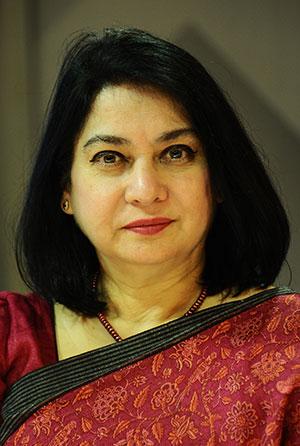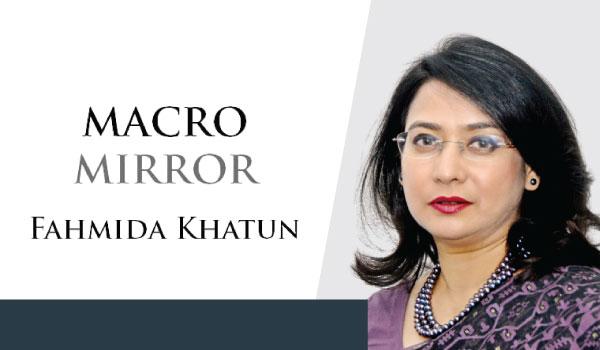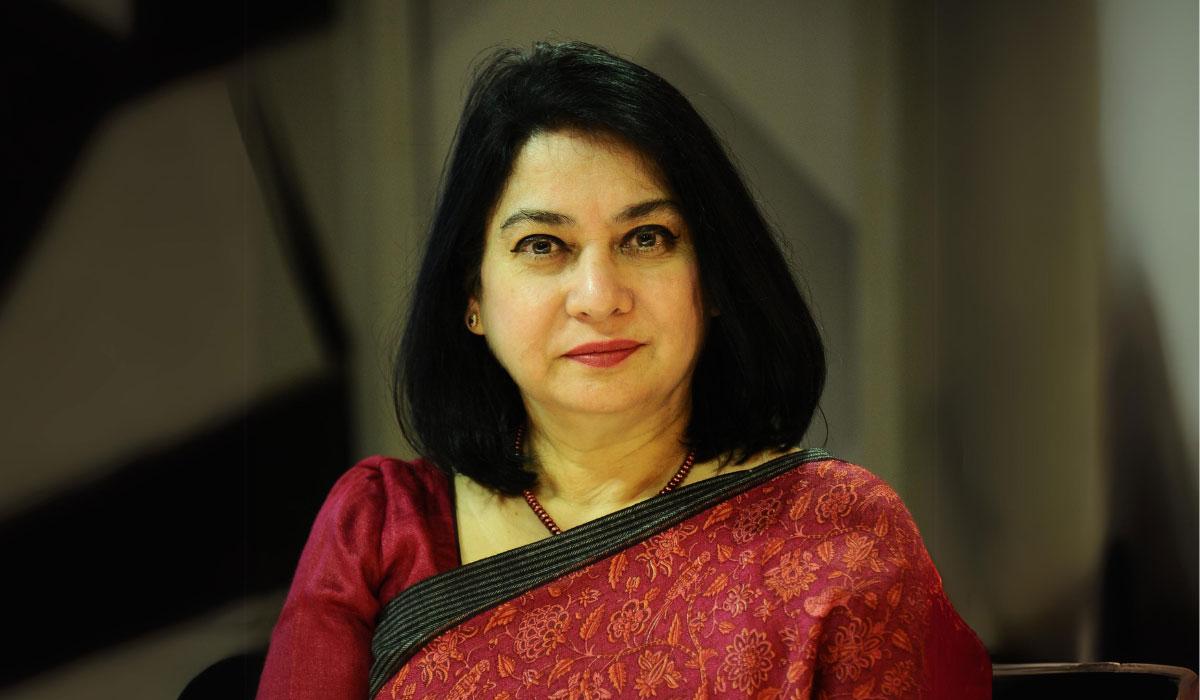Dr Fahmida Khatun

Dr Fahmida Khatun
Executive Director
Centre for Policy Dialogue (CPD)
Phone: (+88 02) 55001184
Expertise and Interest
Macroeconomic policy, climate change, environment, energy economics, development finance and aid effectiveness, international trade and WTO issues, digital economy, youth employment, social issues including health and education, interests of Least Developed Countries (LDCs), Sustainable Development Goals (SDGs), and women’s contribution to the economy
Dr Fahmida Khatun is the Executive Director at the Centre for Policy Dialogue (CPD), a civil society think tank in Bangladesh. Earlier, she worked as a Research Fellow at the BIDS, an Environment Specialist for the UNDP, and an Economist for the USAID Mission in Bangladesh. She taught economics at universities in Bangladesh and England and was a Visiting Fellow at various international research organisations.
Dr Khatun sits regularly in various policy-making and advisory bodies at home and abroad. She is a member of the Board of Bangladesh Bank. Dr Khatun is a member of the High-level Advisory Board on the Productive Capacities Index of UNCTAD. She is also a member of the BRAC Board, the largest non-governmental organisation in the world, which works for the cause of the left-behind people. Dr Khatun is a member of the Task Force on Climate, Development, and the International Monetary Fund (IMF), an initiative of Boston University, USA. In 2023, she was the Co-Chair of the T20 Task Force on “Accelerating SDGs: Exploring New Pathways to the 2030 Agenda” to the G20.
She did her Postdoctoral research at Columbia University, USA, and undertook joint research with Professor Jeffery Sachs. She has a Masters and PhD in Economics from University College London (UCL), University of London. She has also participated in the Leadership Decision-Making programme at Harvard University, USA.
Dr Khatun’s expertise includes macroeconomic policy, climate change, environment, energy economics, aid effectiveness, international trade and WTO issues, digital economy, youth employment, social issues including health and education, interests of Least Developed Countries, Sustainable Development Goals, and women’s contribution to the economy.
She has several publications to her credit at home and abroad (https://cpd.org.bd/resources/2024/08/FK_Selected-Publications-August-2024.pdf).
Dr Khatun regularly speaks on economic issues in the national and international media, including BBC World Service Television, Al-Jazeera Television, and Voice of America Radio. She regularly contributed to BBC Bangla at the BBC World Service during 1991-96 in London. She hosted popular talk shows on national television on economic issues. She is a columnist for the Daily Star, a leading daily in Bangladesh (https://www.thedailystar.net/author/dr-fahmida-khatun). She is invited regularly to write for the East Asia Forum based in the Crawford School of Public Policy at the Australian National University (https://eastasiaforum.org/author/fahmidakhatun/).
Selected Publications (as of March 2025)
Books
Khatun, F., & Saadat, S. Y. Governance in the Banking Sector: The Case of Bangladesh. [Forthcoming].
Khatun, F., Saadat, S. Y. & Richi, A. F. Bangladesh Facing Industry 4.0: Readiness and Required Response. [Forthcoming].
Khatun, F., Saadat, S.Y., Ashraf, K. & Mahbub, A. (2023). Bangladesh-Japan Partnership for the Next Development Journey, Palgrave Macmillan.
Khatun, F., Saadat, S. Y., Ashraf, K., & Taki, M. A. T. (2022). Skills Gap and Youth Employment in Bangladesh: An Exploratory Analysis. Dhaka: Centre for Policy Dialogue (CPD) and Friedrich-Ebert-Stiftung (FES) Bangladesh. https://cpd.org.bd/resources/2022/05/Skills-Gap-and-Youth-Employment-in-Bangladesh-An-Exploratory-Analysis.pdf
Khatun, F. & Saadat, S.Y (2020). Youth Employment in Bangladesh: Creating Opportunities Reaping Dividends. Palgrave Macmillan.
Khatun, F., Bhattacharya, D., Rahman, M., Moazzem, K.G., Khan, T.I., Sabbih, M.A. and Saadat, S.Y. (2020). Four Years of SDGs in Bangladesh: Measuring Progress and Charting the Path Forward. Dhaka: Centre for Policy Dialogue (CPD) and Citizen’s Platform for SDGs, Bangladesh.
Khatun, F. & Saadat, S.Y (2018). The Ignored Generation: Exploring the Dynamics of Youth Employment in Bangladesh. Dhaka: Centre for Policy Dialogue (CPD) and Citizen’s Platform for SDGs, Bangladesh. https://cpd.org.bd/the-ignored-generation-exploring-the-amics-of-youth-employment-in-bangladesh/
Khatun, F., Towfiqul Islam Khan, Shahida Pervin and Hosna Jahan (2015). Estimating Women’s Contribution to the Economy: The Case of Bangladesh. Centre for Policy Dialogue. December 2015. https://cpd.org.bd/estimating-womens-contribution-to-the-economy-the-case-of-bangladesh/
Khatun, F., Jahan, F., & Yousuf, A. F. (2010). Missing Dynamics of Spousal Violence Discourse in Bangladesh: Measuring the Economic Costs. Centre for Policy Dialogue.
Khatun, F. (2014). বাংলাদেশের অর্থনীতিঃ ভেতর ও বাহির (Bangladesh’s Economy: Inside and Outside), Dhaka: Centre for Policy Dialogue (CPD) and Agamee Prakashani.
Khatun, F (2005) (co-author). Options for Self-Reliant Resurgence: CPD’s Rapid Assessment of Flood 2004, University Press Limited, Dhaka, Bangladesh, February 2005.
Book Chapters
Khatun, F., Nawrin, N., Mahbub, A., & Islam, M. B. (2024). Equity for the Women in Workplace in Bangladesh: An Exploratory Study. In Empowering and Advancing Women Leaders and Entrepreneurs. IGI Global. https://www.igi-global.com/chapter/equity-for-the-women-in-workplace-in-bangladesh/348644.
Khatun, F. (2022). Issues for Bangladesh. In Mathur, V. & Roy, A. (Eds.) Towards a Low-Carbon and Climate Resilient World: Expectations from COP26. Special Report No. 165. Observer Research Foundation (ORF). https://www.orfonline.org/wp-content/uploads/2021/11/ORF_SpecialReport_165_Expectations-COP26.pdf
Khatun, F. (2022). Economy. In Ahmed, I. (Eds.) Bangladesh Foreign Policypaedia (Volume 10): Engendering Foreign Policy. Centre for Genocide Studies, University of Dhaka.
Khatun, F. & Saadat, S.Y. (2020). Role of Social Protection in Ensuring Inclusive Growth. In Muqtada, M. (Eds.) Quest for Inclusive Growth in Bangladesh: An Employment-focused Strategy. Springer. https://doi.org/10.1007/978-981-15-7614-0
Khatun, F. & Muqtada, M. (2020). The Quest for an Inclusive Growth Strategy. In Muqtada, M. (Eds.) Quest for Inclusive Growth in Bangladesh: An Employment-focused Strategy. Springer. https://doi.org/10.1007/978-981-15-7614-0
Khatun, F. (2019). ‘Social Science Research and TTI: Bangladesh’, Chapter 16, in Strengthening Policy Research: Role of Think Tank Initiative in South Asia, edited by Sukhadeo Thorat, Ajay Dixit and Samar Verma, pp 225 – 235. Sage Publications India Pvt. Ltd
Khatun, F. (2019). ‘Centre for Policy Dialogue’, Chapter 3 in Strengthening Policy Research: Role of Think Tank Initiative in South Asia, edited by Sukhadeo Thorat, Ajay Dixit and Samar Verma, pp 42-56. Sage Publications India Pvt. Ltd
Khatun F, Shahida Pervin and Md Masudur Rahman (2019). Bangladesh’s pursuit of the 2030 Agenda: will it facilitate smooth graduation? in Bangladesh’s Graduation from the Least Developed Countries Group: Pitfalls and Promises. London: Routledge
Khatun, F. (2016). ‘Development Policies since Independence’, in Routledge Handbook of Contemporary Bangladesh, published by Routledge | Taylor & Francis Group. https://www.routledge.com/Routledge-Handbook-of-Contemporary-Bangladesh/Riaz-%20Rahman/p/book/9780415734615
Khatun, F. & Amin, M. A. (2016). “Carbon Emission, Energy Consumption, Deforestation and Agricultural Income in LDCs: Lessons for Post-2015 Development Agenda.” In Southern Perspectives on the Post-2015 International Development Agenda. London and New York: Routledge.
Khatun, F. (2016). “ICT & Financial Inclusion.” In ICT & SDGs: How Information and Communications Technology can Accelerate Action on the Sustainable Development Goals. New York: The Earth Institute, Columbia University and Ericsson. http://www.ericsson.com/res/docs/2015/ict-and-sdg-interim-report.pdf
Khatun, F. (2016). [Thematic contributor for the report] State of the Least Developed Countries 2016: Coherence and Synergies between the IPoA and the 2030 Agenda. New York: United Nations Office of the High Representative for the Least Developed Countries, Landlocked Developing Countries and Small Island Developing States (UN-OHRLLS). http://unohrlls.org/custom-content/uploads/2016/08/State-of-LDCs2016.pdf
Khatun, F. and Ahamad, M. (2014). “ODA to and External Debt in LDCs: Recent Trends.” In Istanbul Programme of Action for the LDCs (2011–2020): Monitoring Deliverables, Tracking Progress – Analytical Perspective. London: Commonwealth Secretariat.
Khatun, F. and Hossain, S. (2014). “India’s Economic Rise: Implications for Bangladesh.” In Joseph, M. and Jacob, H. (Eds.) India’s Economic Growth: Opportunities and Challenges for the Region [Australia India Institute Foreign Policy Series 5]. New Delhi: Australia India Institute (University of Melbourne), Regional Centre for Strategic Studies (Colombo) and Manohar Publishers.
Khatun, F. (2012). “A Regional Outlook for Climate Finance in South Asia.” In Bhattacharya, D. and Rahman, M. (eds.) Global Recovery, New Risks and Sustainable Growth: Repositioning South Asia. Dhaka: Centre for Policy Dialogue.
Khatun, F. (2012). “WTO negotiations on environmental goods and services: South Asia’s interests”. In Kelegama, S., Adhikari, R., Sharma, P. and Kharel, P. (eds.) Regional Economic Integration: Challenges for South Asia during Turbulent Times. Kathmandu: South Asia Watch on Trade, Economics and Environment (SAWTEE) and South Asia Centre for Policy Studies (SACEPS), pp 253-268.
Khatun, F (2009). “Migrant labour and remittances in Bangladesh”, in: Stoler, A. L., J. Redden and L. A. Jackson. Trade and Poverty Reduction in the Asia-pacific Region: Case Studies and Lessons from Low-income Communities. Cambridge: Cambridge University Press, 2009. Pp 513-539.
Khatun, F., K. M. Rahman and A. Nabi (2009). “100 Day Employment Generation Programme in Bangladesh: Challenges of Effective Implementation”, in Development of Bangladesh with Equity and Justice, June 2009, Centre for Policy Dialogue, Dhaka.
Khatun, F (2008). “Environmental Problems and Challenges for Sustainable Development in Bangladesh”, in Independent Review of Bangladesh Economy, University Press Limited, Dhaka.
Khatun, F (various issues since 2002) (co-author). Independent Review of the Bangladesh Economy (co-author), Centre for Policy Dialogue, Dhaka.
Khatun, F and K. G. Moazzem (2008). “Minimum Wage for the Workers in the Ready-Made Garments Workers” in Ready Made Garments of Bangladesh during the Quota Free World of Bangladesh during the Quota Free World, (Bangla book), Centre for Policy Dialogue, February 2008.
Khatun, F., M Rahman., D Bhattacharya and K G Moazzem (2008). “Trade Liberalisation and Female Workers: Experience of the Ready-Made Garments Industry in Bangladesh” in Ready Made Garments of Bangladesh during the Quota Free World of Bangladesh during the Quota Free World, (bangla book), Centre for Policy Dialogue, Dhaka, February 2008.
Khatun, F (2007). “Bangladesh in the WTO, chapter in South Asia in the WTO”, in: S Kelegama (ed) ‘South Asia in the WTO’, published by Sage Publications India, 2007.
Khatun, F (2006). “Duty Free Quota Free Market Access for South Asian LDCs”, in: Chimni, B.S., B.L. Das., S Kelegama and M Rahman (eds). South Asia Yearbook of Trade and Development 2006, Centre for Trade and Development (CENTAD), Oxfam GB, India, published by Wiley-India.
Bhattacharya, D and F. Khatun (2006). “Macroeconomic Stability and Growth Performance in South Asian Countries: A Comparative Perspective on Bangladesh”, in: Independent Review of Bangladesh’s Development, implemented by the Centre for Policy Dialogue, University Press Limited, Dhaka, Bangladesh, 2006.
Bhattacharya, D., M. Rahman., U. Deb and F. Khatun (2006). “Hong Kong Declaration and Bangladesh’s Achievement” in: D. Bhattacharya., M. Rahman., U. Deb and F. Khatun (eds). The Hong Kong declaration of the WTO: What is achieved and what should be done by Bangladesh, (in Bangla) Centre for Policy Dialogue, Dhaka, February 2006.
Bhattacharya D and F. Khatun (2006). “Importance of the Forthcoming Hong Ministerial Meeting: Current Situation of Discussions on the World Trade and Bangladesh’s Gains and Losses” in: Bhattacharya, D., M. Rahman, U. Deb and F. Khatun (eds). The Hong Kong Declaration of the WTO: What is achieved and what should be done by Bangladesh, (in Bangla) Centre for Policy Dialogue, Dhaka, February 2006.
Khatun, F (2005) (co-author). Options for Self-Reliant Resurgence: CPD’s Rapid Assessment of Flood 2004, University Press Limited, Dhaka, Bangladesh, February 2005.
Khatun, F., M. S. Ahmed and U. Deb (2004). “Trade Related Intellectual Property Rights in the Context of Bangladesh”, in: World Trade Organisation and Bangladesh: Post Cancun Assessment (in Bangla), Centre for Policy Dialogue, 2004.
Khatun, F (2004). “Environmental Debates in the WTO and Interest of Bangladesh” in: World Trade Organisation and Bangladesh: Post Cancun Assessment (in Bangla), Centre for Policy Dialogue, 2004.
Khatun, F (2003). “Population and Environment in Bangladesh: Designing a Policy Accounting for Linkages”, in: Demographic Dynamics in Bangladesh: Looking at the Larger Picture, Centre for Policy Dialogue, UNFPA, Pathak Shamabesh, 2003.
Khatun, F (1999). “Environmental Valuation: Concepts and Issues”, in: Qazi Kholiquzzaman and others (eds). Environmental Economics, International Union of Conservation of Nature and Natural Resources (IUCN), Dhaka, 1999.
Khatun, F., & Saadat, S. Y. Food Price Inflation in Bangladesh: Can Minimum Wage Workers Survive? [Forthcoming].
Khatun, F., Saadat, S. Y., & Richi, A. F. From Idea to Impact: Intellectual Property’s Role in Advancing Climate Solutions. [Forthcoming].
Khatun, F., Saadat, S. Y., Mahbub, A., & Islam, M. B. Plastic Pollution: The Case of Dhaka City. [Forthcoming].
Khatun, F., Saadat, S. Y., Mahbub, A., & Islam, M. B. Cost of Breathable Air: Air Pollution in Dhaka City. [Forthcoming].
Khatun, F. & Saadat, S.Y. Impact of Technology and Information Services on Health Outcomes: An Econometric Analysis of Health Facility Data in Bangladesh. [Forthcoming].
Khatun, F. & Saadat, S.Y. Non-performing Loans in the Banking Sector of Bangladesh: An Empirical Analysis. South Asian Journal of Macroeconomics and Public Finance. [Forthcoming].
Khatun, F., & Saadat, S. (2021). Climate Change in Bangladesh: A Sustainable Development Perspective. Journal of New Economics, 1(2), 79-103.
Khatun, F. & Saadat, S.Y. (2021). The Optimum Level of Income Inequality in South Asia: An Econometric Analysis, South Asia Economic Journal. https://doi.org/10.1177/13915614211039087
Khatun, F. & Saadat, S.Y. (2021). Returns to Computer Use in Bangladesh: An Econometric Analysis, The Indian Journal of Labour Economics, Vol 64, Pp. 175-198. https://doi.org/10.1007/s41027-021-00304-2
Khatun, F (2020). ‘Growth Narrative of Bangladesh Economy’, Journal of Governance, Security & Development ISSN: 2708-2490 Vol 1 No. 1 2020: 73-107. http://jgsd.cgs-bd.com/realtech/pdf/03-Fahmida-Khatun.pdf
Khatun, F. and Saadat, S.Y. (2020). Fourth Industrial Revolution, Technological Advancement and Youth Employment: A South Asian Perspective. South Asian Economic Journal, Vol. 21, No. 1, pp. 58-75.
Khatun, F. and Saadat, S.Y. (2020). Bangladesh’s Participation in the Belt and Road Initiative: Interests and Problems. South and Southeast Asian Studies, Vol. 2, No. 2 pp. 31-43.
Khatun, F. and Syed Yusuf Saadat (2019). ‘Governance and Competitiveness: An Econometric Analysis of the Banking Sector of Bangladesh’. Journal of Statistical and Econometric Methods, vol.8, no.4, 2019, 51-77. http://www.scienpress.com/Upload/JSEM/Vol%208_4_4.pdf
Khatun, F. and Ahamad, M.G. (2015). “Foreign Direct Investment in the Energy and Power Sector in Bangladesh: How does it contribute to Economic Growth?” in Renewable & Sustainable Energy Reviews. Volume 52, December 2015, Pages 1369-77. http://www.sciencedirect.com/science/article/pii/S136403211500862X
Khatun, F. and Ahamad, M.G. (2013). “Liberalising Trade in Health Services: Constraints and Prospects for South Asian Countries.” The International Journal of Health Planning and Management. Volume 30, Issue 1, Pages 57-70, January-March 2015. http://onlinelibrary.wiley.com/doi/10.1002/hpm.2205/abstract
Khatun, F. (2012). “Trade in Environmental Goods by Least Developed Countries: Issues for Negotiations”, South Asian Economic Journal (SAEJ), 13(2): pp 157-182; September 2012.
Khatun, F (2007). “Minimum Wage in the Ready-Made Garments in Bangladesh” in: Bangladesh Unnayan Shomikhkha (in Bangla). Bangladesh Institute of Development Studies, February 2007.
Bhattacharya, D., M. Rahman., U. Deb and F. Khatun (2006). “Hong Kong Declaration of the WTO: Reflections on the Outcomes from Bangladesh Perspective”, in: Journal of the Cost and Management, Vol. 34, No.2, March-April 2006, pp 68-83, Bangladesh.
Khatun, F (2005). “Trade Related Intellectual Property Rights and Public Health in Least Developed Countries” (in Bangla), Bangladesh Unnayan Shamikhkha, Bangladesh Institute of Development Studies (BIDS), February 2005.
Khatun, F (1999). “An Economic Analysis of Protecting Bangladesh from Sea Level Rise” Bangladesh Unnayan Shamikhkha, Bangla journal of the Bangladesh Institute of Development Studies (BIDS), Vol. 16, Bangladesh Institute of Development Studies, February 1999.
Khatun, F (1998). “Environmental Degradation and Sustainable Development”, Bangladesh Unnayan Shamikhkha, Bangla journal of the Bangladesh Institute of Development Studies (BIDS), Vol. 15, Bangladesh Institute of Development Studies, February 1998.
Khatun, F (1998). “Environment and Sustainable Development in Bangladesh”, Journal of Social Studies, No. 80, Dhaka University, April 1998.
Khatun, F (1997). “Foreign Private Investment in Bangladesh BIISS Journal, Vol. 9, No. 3, September 1988”, Bangladesh Institute of International and Strategic Studies, Dhaka.
Khatun, F (1997). “The Cost of Particulate Air Pollution in Dhaka City”, The Bangladesh Development Studies (BDS), Nos. 1 and 2, Vol. XXV, March-June 1997.
Khatun, F (1991). “Poverty Alleviation and Economic Development in Bangladesh”, Journal of Social Studies, No. 41, Dhaka University, August 1991.
Khatun, F (1990). “Devaluation and the Economy of Bangladesh”, Bangladesh Unnayan Shamikhkha, Bangla journal of the Bangladesh Institute of Development Studies (BIDS), Vol 8, February 1990.
Khatun, F (1989). “Socio-economic Condition of Female Workers in Garments Industries in Bangladesh”, Bangladesh Unnayan Shamikhkha, Bangla journal of the Bangladesh Institute of Development Studies (BIDS), Vol. 6, February 1989.
Khatun, F., Saadat, S. Y., & Mahbub, A. The Resilience and Sustainability Facility: A Case Study on Bangladesh. [CPD Working Paper]. Centre for Policy Dialogue (CPD). [Forthcoming].
Khatun, F., Saadat, S. Y., Mahbub, A., & Saleh, Z. W. Navigating Debt, Development, and Disasters: Can Bangladesh Prevail? [Technical Paper]. Task Force on Climate, Development, and the International Monetary Fund (TCD IMF). Global Development Policy Center, Boston University. [Forthcoming].
Khatun, F., Saadat, S.Y., Joita, M.R. & Reza, L. The Price Pandemic: An Overview of Inflation in Bangladesh, CPD Working Paper Series, CPD Working Paper, Centre for Policy Dialogue (CPD). [Forthcoming].
Khatun, F. & Saadat, S.Y. (2022). Climate Change in Bangladesh: Exploring the Past and Potential Future Impacts, CPD Working Paper Series, CPD Working Paper 145, Centre for Policy Dialogue (CPD). https://cpd.org.bd/resources/2022/07/Climate-Change-in-Bangladesh-Exploring-the-Past-and-Potential-Future-Impacts.pdf
Khatun, F., Behtarin, J., Feroz, K., & Nawrin, N. (2022). Budget Framework Analysis on Challenging Fear of Violence. Dhaka: Plan International Bangladesh. https://cpd.org.bd/publication/budget-framework-analysis-on-challenging-fear-of-violence/
Khatun, F., Shadat, W. B., & Kabir, F. A. (2021). Establishing a Blended Finance Mechanism Involving Climate Funds in Bangladesh: Opportunities and Challenges. CPD Working Paper 141. Dhaka: Centre for Policy Dialogue (CPD). https://cpd.org.bd/resources/2021/12/Establishing-a-Blended-Finance-Mechanism-Involving-Climate-Funds-in-Bangladesh.pdf
Khatun, F. & Saadat, S.Y. (2021). Implementation of the SDGs in Bangladesh: Domestic Challenges and Regional Considerations, South and South-West Asia Development Papers Series, South and South-West Asia Development Paper 21-02, United Nations Economic and Social Commission for Asia and the Pacific (UNESCAP) South and South-West Asia Office (SSWA). https://www.unescap.org/sites/default/d8files/knowledge-products/SSWA%20DP%2021-02_SDG%20Implementation%20in%20Bangladesh.pdf
Khatun, F. & Saadat, S.Y. (2021). Transforming Bangladesh’s Health Sector in the Fourth Industrial Revolution, CPD Working Paper Series, CPD Working Paper, Centre for Policy Dialogue (CPD). https://cpd.org.bd/resources/2021/11/Transforming-Bangladeshs-Health-Sector-in-the-Fourth-Industrial-Revolution.pdf
Khatun, F. & Saadat, S.Y. (2021). The Belt and Road Initiative: A Bangladesh Perspective, CPD Working Paper Series, CPD Working Paper 137, Centre for Policy Dialogue (CPD). https://cpd.org.bd/resources/2021/08/Belt-and-Road-Initiative-What-Are-Bangladeshs-Interests.pdf
Khatun, F., Saadat, S.Y. & Islam, M.J. (2021). Digital Platform Economy in Bangladesh: Opportunities and Challenges, Centre for Policy Dialogue (CPD).
https://cpd.org.bd/publication/digital-platform-economy-in-bangladesh/
Contributing author. (2020). Corona Pandemic and Bangladesh: Health and Economic Risks and Recommendations. CPD Working Paper Series, CPD Working Paper 133, Centre for Policy Dialogue (CPD). https://cpd.org.bd/publication/corona-pandemic-and-bangladesh-health-and-economic-risks-and-recommendations/
Khatun, F. Saadat, S.Y., & Kamruzzaman, M. (2019). Finance for SDGs: Addressing Governance Challenge of Aid Utilisation in Bangladesh. CPD Working Paper Series, CPD Working Paper 125, Centre for Policy Dialogue (CPD). https://cpd.org.bd/resources/2019/11/CPD-Working-Paper-125-FINANCE-FOR-SDGs-Addressing-Governance-Challenge-of-Aid-Utilisation-in-Bangladesh-.pdf
Khatun, F. & Saadat, S.Y. (2018). Towards a Social Protection Strategy for Bangladesh, CPD Working Paper Series, CPD Working Paper 117, Centre for Policy Dialogue (CPD).
https://cpd.org.bd/publication/towards-a-social-protection-strategy-for-bangladesh/
Khatun, F., F. Jahan and A. Yousuf (2010). Missing Dynamics of Spousal Violence Discourse in Bangladesh: Measuring the Economic Costs, CPD Research Monograph 6, Centre for Policy Dialogue (CPD), October 2010, Dhaka. http://cpd.org.bd/cpd-researchmonograph-6-missing-dynamics-of-spousal-violence-discourse-in-bangladesh-measuringthe-economic-costs/
Khatun, F, M. Rahman, D. Bhattacharya and K.G. Moazzem (2008). Gender and Trade Liberalisation in Bangladesh: The Case of Ready Made Garments, CPD Monograph 2, Centre for Policy Dialogue, February 2008. http://cpd.org.bd/cpd-research-monograph-2gender-and-trade-liberalisation-in-bangladesh-the-case-of-the-readymade-garments/
Khatun, F (2006). Fish Trade Liberalisation in Bangladesh: Implications of SPS Measures and Eco-Labelling for the Export Oriented Shrimp Sector, Research Monograph 1, Centre for Policy Dialogue, February 2006; also published by the Natural Resources Institute (NRI), the University of Greenwich, UK and FAO, July 2004, Italy. www.nri.org/projects/fishtrade/bangladesh.pdf
Khatun, F, & Rambarran, J. “Chapter 3: Responding to Shocks and Mitigating Crises.” In Task Force Report. Task Force on Climate, Development and the International Monetary Fund (IMF), Global Development Policy Center, Boston University. [Forthcoming].
Khatun, F., Saadat, S. Y. & Richi, A. F. Accelerating the Growth of Bangladesh’s Pharmaceuticals Industry: Strategies for Post-LDC Technological Competitiveness. [CPD-FES Policy Brief]. Centre for Policy Dialogue (CPD) and Friedrich Ebert Stiftung (FES). [Forthcoming].
Khatun, F., Saadat, S. Y. & Mahbub, A. (2024). Education Budget of Bangladesh: Investing Resources for Improved Learning Outcomes. [IRBD Policy Brief]. Centre for Policy Dialogue (CPD). https://cpd.org.bd/publication/education-budget-of-bangladesh-investing-resources-for-improved-learning-outcomes/
Khatun, F., Saadat, S. Y. & Richi, A. F. (2024). Health Budget of Bangladesh: Optimising Resources for Improved Health Outcomes. [IRBD Policy Brief]. Centre for Policy Dialogue (CPD). https://cpd.org.bd/publication/health-budget-of-bangladesh-optimising-resources-for-improved-health-outcomes/
Khatun, F., Saadat, S. Y., Saleh, Z. W. & Ahsan, F. T. (2024). Social Safety Net Budget of Bangladesh: Catching Some, Missing Many. [IRBD Policy Brief]. Centre for Policy Dialogue (CPD). https://cpd.org.bd/publication/social-safety-net-budget-of-bangladesh-catching-some-missing-many/
Khatun, F., Saadat, S. Y. & Kabir, F. A. (2024). Climate Budget of Bangladesh: Balancing Needs and Building Resilience. [IRBD Policy Brief]. Centre for Policy Dialogue (CPD). https://cpd.org.bd/publication/climate-budget-of-bangladesh-balancing-needs-and-building-resilience/
Khatun, F., Saadat, S. Y. & Huq, P. K. (2024). Gender Budget of Bangladesh: Pursuing Parity. [IRBD Policy Brief]. Centre for Policy Dialogue (CPD). https://cpd.org.bd/publication/gender-budget-of-bangladesh-pursuing-parity/
ontributing author. (2024). Achieving Catalytic Impact with the Resilience and Sustainability Trust. Task Force on Climate, Development, and the International Monetary Fund (TCD IMF). Global Development Policy Center, Boston University. https://cpd.org.bd/resources/2024/04/Achieving-Catalytic-Impact-with-the-Resilience-and-Sustainability-Trust.pdf
Khatun, F., & Bari, E. (2024). Prospect of Renewable Energy Transition in Bangladesh’s RMG Industry. Centre for Policy Dialogue (CPD). https://cpd.org.bd/publication/prospect-of-renewable-energy-transition-in-bangladeshs-rmg-industry/
Khatun, F., Saadat, S. Y., & Mahbub, A. (2024). Leather Industry in Bangladesh: An Analysis of the Value Chain. [CPD Policy Brief]. Centre for Policy Dialogue (CPD). https://cpd.org.bd/publication/leather-industry-in-bangladesh-an-analysis-of-the-value-chain/
Khatun, F., Saadat, S. Y., & Mahbub, A. (2024). Bicycle Industry in Bangladesh: An Analysis of the Value Chain. [CPD Policy Brief]. Centre for Policy Dialogue (CPD). https://cpd.org.bd/publication/bicycle-industry-in-bangladesh-an-analysis-of-the-value-chain/
Khatun, F., Saadat, S. Y., & Mahbub, A. (2024). Readymade Garments Industry in Bangladesh: An Analysis of the Value Chain. [CPD Policy Brief]. Centre for Policy Dialogue (CPD). https://cpd.org.bd/publication/readymade-garments-industry-in-bangladesh-an-analysis-of-the-value-chain/
Khatun, F., Saadat, S. Y., Mahbub, A., & Islam, M. A. (2024). The Challenge of Air and Plastic Pollution: A Policy Toolkit for Greening Cities [CPD Green Cities Initiative Policy Toolkit]. Centre for Policy Dialogue (CPD). https://cpd.org.bd/resources/2024/03/The-Challenge-of-Air-and-Plastic-Pollution.pdf
Khatun, F., Nawrin, N., Kabir, F.A. ,& Neelormi, S. (2023). Financing for Women’s Empowerment in the Context of Post-COVID Recovery and LDC Graduation of Bangladesh. Centre for Policy Dialogue (CPD). https://cpd.org.bd/publication/financing-for-womens-empowerment-in-the-context-of-post-covid-recovery-and-ldc-graduation-of-bangladesh/
Khatun, F., Kamal, M., Kabir, F. A., Nawrin, N., & Hoque, M. S. (2023). Securing Green Transition of the Textile and RMG Sector. Final Report. Centre for Policy Dialogue (CPD). https://cpd.org.bd/publication/securing-green-transition-of-the-textile-and-rmg-sector/
Khatun, F., Saadat, S. Y., Mahbub, A., & Islam, M. A. (2023). Reducing Air and Plastic Pollution- Towards Green Cities in Bangladesh. [CPD Green Cities Initiative Final Report]. Centre for Policy Dialogue (CPD). https://cpd.org.bd/publication/reducing-air-and-plastic-pollution-towards-green-cities-in-bangladesh/
Khatun, F., Saadat, S. Y., Islam, M. B., and Reza, L., (2023). High and Rising: Air Pollution in Bangladesh. [CPD Green Cities Initiative Final Report]. Centre for Policy Dialogue (CPD). https://cpd.org.bd/publication/high-and-rising-air-pollution-in-bangladesh/
Khatun, F., Saadat, S. Y., Mahbub, A. & Islam, M. B. (2023). Green Cities in Bangladesh: Policy Recommendations in the Context of IMF’s Resilience and Sustainability Facility (RSF). [CPD Green Cities Initiative Special Report]. Centre for Policy Dialogue (CPD). https://cpd.org.bd/resources/2023/05/Green-Cities-in-Bangladesh-Policy-Recommendations-in-the-Context-of-IMFs-RSF.pdf
Khatun, F., Saadat, S. Y., & Mahbub, A. (2023). Wrapped in Plastic: The State of Plastic Pollution in Bangladesh [CPD Green Cities Initiative Briefing Note]. Centre for Policy Dialogue (CPD). https://cpd.org.bd/publication/wrapped-in-plastic-the-state-of-plastic-pollution-in-bangladesh/
Khatun, F., Saadat, S. Y., & Ashraf, K. (2023). Breathing Easy: An Assessment of Air Pollution in Bangladesh [CPD Green Cities Initiative Briefing Note]. Centre for Policy Dialogue (CPD). https://cpd.org.bd/publication/breathing-uneasy-an-assessment-of-air-pollution-in-bangladesh/
Khatun, F., Bari, E., & Kabir, F. A. (2022). Green Energy Transition in Bangladesh Examining Support Measures and Estimating Investment Requirements. Final Report. Centre for Policy Dialogue (CPD). https://cpd.org.bd/publication/green-energy-transition-in-bangladesh-examining-support-measures-and-estimating-investment-requirements/
Khatun, F., Saadat, S.Y., Ashraf, K. & Mahbub, A. (2022). Strengthening Bangladesh-Japan Partnership Through Enhanced Trade, Investment, and Technological Collaboration. https://cpd.org.bd/resources/2022/05/Strengthening-Bangladesh-Japan-Partnership-Through-Enhanced-Trade-Investment-and-Technological-Collaboration.pdf
Khatun, F., Saadat, S.Y., Ashraf, K. & Taki, M.A.T. (2022). Youth Skills for Youth Employment: A Policy Perspective. CPD-FES Policy Brief Series. Centre for Policy Dialogue (CPD). https://cpd.org.bd/resources/2022/05/Youth-Skills-for-Youth-Employment.pdf
Khatun, F., (2021). The Covid-19 Vaccination Agenda in Bangladesh: Increase Supply, Reduce Hesitancy. https://www.orfonline.org/wp-content/uploads/2021/11/ORF_SpecialReport_168_Vaccination-Bangladesh.pdf
Khatun, F. & Saadat, S.Y. (2021). CPD’s Reaction to the MPS FY2021-22: To What Extent Does Monetary Policy Meet the Needs of the Economy? CPD Policy Brief Series. CPD Policy Brief 2021 (02). Centre for Policy Dialogue (CPD). https://cpd.org.bd/publication/cpds-reaction-to-the-mps-fy2021-22/
Khatun, F. & Saadat, S.Y. (2021). How Useful the Stimulus Packages Have Been for Women in Tackling the Impact of Covid-19: Findings from a Rapid Assessment in Bangladesh. CPD-UN Women Special Report., Centre for Policy Dialogue (CPD). https://cpd.org.bd/resources/2021/09/How-Useful-the-Stimulus-Packages-Have-Been-for-Women-in-Tackling-the-Impact-of-COVID-19.pdf
Khatun, F. & Saadat, S.Y. (2021). Building Resilience of Women during COVID-19. CPD Policy Brief Series. CPD Policy Brief 2021. Centre for Policy Dialogue (CPD). https://cpd.org.bd/resources/2021/09/Building-Resilience-of-Women-During-COVID-19.pdf
Contributor to CPD’s Working Paper 134 (2020). CPD’s Recommendations for the National Budget FY2020-21. https://cpd.org.bd/cpd-working-paper-134-cpds-recommendations-for-the-national-budget-fy2020-21/
Contributor to CPD’s Working Paper 133 (2020). “Corona Pandemic and Bangladesh: Health and Economic Risks and Recommendations”. https://cpd.org.bd/cpd-working-paper-133-corona-pandemic-and-bangladesh-health-and-economic-risks-and-recommendations
Khatun, Fahmida., and Syed Yusuf Saadat (2020). Regional Cooperation for SDG Implementation: A Model for South Asia. Policy Brief 2020 (3). Centre for Policy Dialogue (CPD). https://cpd.org.bd/policy-brief-2020-3-regional-cooperation-for-sdg-implementation/
Khatun, Fahmida., Towfiqul Islam Khan and Kazi Golam Tashfique (2020). Estimating Unpaid Work in Bangladesh’s GDP: A Conceptual Framework for Household Satellite Accounts Approach. Policy Brief 2020 (4). Centre for Policy Dialogue (CPD). https://cpd.org.bd/policy-brief-2020-4-estimating-unpaid-work-in-bangladeshs-gdp/
Khatun, F. Saadat, S.Y., & Kamruzzaman, M. (2019). Finance for SDGs: Addressing Governance Challenge of Aid Utilisation in Bangladesh. CPD Working Paper Series, CPD Working Paper 125, Centre for Policy Dialogue (CPD). https://cpd.org.bd/resources/2019/11/CPD-Working-Paper-125-FINANCE-FOR-SDGs-Addressing-Governance-Challenge-of-Aid-Utilisation-in-Bangladesh-.pdf
Khatun, F. (2019). “BIMSTEC Countries and Climate Change: Imperatives for Action”, ORF Issue Brief No. 299, June 2019, Observer Research Foundation.
Khatun F and Syed Yusuf Saadat (2018). Towards a Social Protection Strategy for Bangladesh, CPD Working Paper 117, August 2018. https://cpd.org.bd/working-paper-117-towards-a-social-protection-strategy-for-bangladesh/
Khatun F and Md Kamruzzaman (2018). ‘Fiscal Implications of Rohingya Crisis for Bangladesh’, Working Paper, CPD Working Paper 120, November 2018. https://cpd.org.bd/cpd-working-paper-120-fiscal-implications-of-rohingya-crisis-for-bangladesh/
Khatun, F. (2015). “10th WTO Ministerial Conference: LDC agenda for Nairobi” authored by CPD Research Director Dr Fahmida Khatun, published by South Asia Watch on Trade, Economics and Environment (SAWTEE) in Trade Insight Vol. 11, No. 3, 2015, Page 14-19. http://www.sawtee.org/publications/Trade-Insight33.pdf
Sachs, Jeffery., Vijay Modi, Fahmida Khatun, Hernan Figueroa, Mariela Machado Fantacchiotti, Kayhan Sanyal and Aditi Shah. (2015). How Information and Communications Technology Can Achieve The Sustainable Development Goals; Earth Institute at Columbia University, New York. http://www.ericsson.com/res/docs/2015/ict-and-sdg-interim-report.pdf
Khatun, F., M A Ali, and U Salma (2014). “Deconstructing South-South Cooperation: A Southern Perspective on Experience and Challenges”. Southern Voice on Post-MDG International Development Goals, April 2014. http://www.ncaer.org/uploads/photo-gallery/files/1400566352Paper-on-South-South-Cooperation.pdf
Khatun, F., Nepolean Dewan and Samina Hossain. (2013). Effectiveness and Impact of Aid for Trade in Bangladesh, International Centre for Trade and Sustainable Development (ICTSD), and Centre for Policy Dialogue, December 2013. http://www.ictsd.org/downloads/2014/01/evaluating-aft-on-the-ground_lessons-from- bangladesh.pdf
Khatun, F., D. Bhattacharya and M. Rahman (2013). “Revisiting the PRSP Process in Bangladesh: Perspectives on Representation, Ownership and Accountability”, CPD Working Paper 105, Centre for Policy Dialogue, Dhaka, October 2013. http://cpd.org.bd/resources/2013/11/WP-105.pdf
Khatun, Fahmida and Samina Hossain. (2012). Adapting to climate change: Issues for South Asia. x+52. Kathmandu: South Asia Watch on Trade, Economics and Environment (SAWTEE).
Khatun, Fahmida and Mazbahul G. Ahamad. (2012). “Investigating the determinants of inflationary trend in Bangladesh: an ARDL bounds F-Test Approach”, Munich Personal RePEc Archive (MPRA), November 2012.
Khatun, F., and M G Ahamad (2012). Liberalising Health Services in South Asia, Implications for Bangladesh, Working Paper 96, Centre for Policy Dialogue, March 2012.
Khatun, F., Towfiqul I K. and Nabi A (2012). ‘National Budget for the Ultra Poor: An Analysis of Allocation and Effectiveness’, CPD-BRAC, Dhaka, April 2012.
Khatun, F et al (2011). “Liberalising Health Services under SAARC Agreement on Trade in Services (SATIS): Implications for South Asian Countries”, lead author, prepared for the Asian Development Bank, Manila, May 2011, published by South Asia Centre for Policy Studies (SACEPS), Paper No 24, May 2011.
Rahman, M., Khatun, F., Hossain, S.S., Iqbal, A and Nabi, A (2011). ‘National Budget: Are the commitments to the children of Bangladesh being kept?’ United Nations Children’s Fund, Bangladesh, ISBN: 978-984-8969-09-0, June 2011. UNICEF-CPD Report.
Khatun, F., Towfiqul I K. and Nabi A (2011). Recommendations for the Members of Parliament from National Budget Analysis for the Ultra Poor, CPD Policy Brief, Centre for Policy Dialogue December 2011.
Khatun, F and Islam AKM (2010). Policy Agenda for Addressing Climate Change in Bangladesh: Copenhagen and Beyond, CPD Occasional Paper Series No 88, Centre for Policy Dialogue, Dhaka, March 2010.
Khatun, F (2009). Trade Negotiations on Environmental Goods and Services in the LDC Context, Discussion Paper, United Nations Development Programme (UNDP), New York, August 2009. https://www.undp.org/sites/g/files/zskgke326/files/publications/EGS%20Paper%20-%20Final.pdf
Khatun, F (2009). Liberalisation of Environmental Goods and Services: South Asian LDC issues, Briefing Paper, No 10, published by South Asian Watch on Trade, Economics and Environment (SAWTEE), Nepal.
Khatun, F (2008). Accra High-Level Forum: Towards a Commonwealth Agenda on Aid Effectiveness, background paper prepared for the meeting of high-level officials, organised by the Commonwealth Secretariat, memo, June 2008.
Khatun, F (2009). Environment Related Trade Barriers and the WTO, Occasional Paper 77, Centre for Policy Dialogue, November 2008.
Khatun, F (2009). Environment Related Trade Barriers and the WTO, Occasional Paper 77, Centre for Policy Dialogue, November 2008.
Khatun, F (2009). Accra Conference on Aid Effectiveness: Perspectives from Bangladesh, Occasional Paper No 76, Centre for Policy Dialogue, Dhaka, November 2008.
Ash, F and F. Khatun (2006). Aquaculture: Issues and Options for Sustainable Productions and Trade, co-author, Issue Paper No. 5, International Centre for Trade and Sustainable Development (ICTSD), Geneva, July 2006.
Bhattacharya., M. Rahman., U. Deb and F. Khatun (2005). “Hong Kong Declaration of the WTO: Reflections on the Outcomes from Bangladesh Perspective”, CPD Trade Policy Brief Series 12, December 2005.
Bhattacharya, D., M. Rahman., U. Deb., U., A. Raihan and F. Khatun (2005). “Road to Hong Kong Ministerial of the WTO: Anticipating the First Approximations from Bangladesh Perspective”, CPD Occasional Paper Series 49, Centre for Policy Dialogue, May 2005.
Khatun, F., D. Bhattacharya, M. Rahman (2004). Fisheries Subsidies and Marine Fisheries Resource Management: Lessons from Bangladesh, United Nations Environment Programme (UNEP), Geneva, April 2004.
Khatun, F (2004). Environmental Debates in the WTO: Defining Bangladesh’s Interests, Occasional Paper No. 35, Centre for Policy Dialogue (CPD), Dhaka, Bangladesh, February 2004.
Bhattacharya, D., M. Rahman., A. Raihan., M. A. Tipu and F. Khatun (2003). Ongoing WTO Negotiations and Bangladesh’s Interests: Insights from CPD’s October 2002 Tracking Missions to Geneva, CPD Occasional Paper No. 34, December 2003.
Bhattacharya, D., M. Rahman and F. Khatun (1999). Environmental Impacts of Trade Liberalisation and Policies for the Sustainable Management of Natural Resource – A Case Study on Bangladesh’s Shrimp Farming Industry, United Nations Environment Programme (UNEP), Geneva, November 1999.
Khatun, F (1998). Depreciation of Forest Resources in Bangladesh, Research Report No. 157, Bangladesh Institute of Development Studies, Dhaka, May 1998.
Khatun, F (1998). “Poverty and Environment: Delusion and Reality”, Chapter for the Report on South Asia Poverty Monitor, Bangladesh Institute of Development Studies, 1998, Mimeo.
Khatun, F (1998). “Women in Bangladesh: Lives That Still Get Less”, Chapter for the Report on South Asia Poverty Monitor, Bangladesh Institute of Development Studies, 1998, Mimeo.
Asaduzzaman and F. Khatun (1991). Evaluation of Women’s Poverty Alleviation Programmes in Bangladesh, Bangladesh Institute of Development Studies, 1991, Mimeo.
Khatun, F. (2014). “Implementing Post-2015 Agenda in Bangladesh through Domestic Resource Mobilisation;” Post2015.org, 10 December. Available at: http://post2015.org/2014/12/10/implementing-post-2015-agenda-in-bangladeshthrough-domestic-resource-mobilisation/
In East Asia Forum
Khatun, F. (2023). Institutional reform needed for Bangladesh’s economic challenges. 7 January 2023;
https://eastasiaforum.org/2023/01/07/institutional-reform-needed-for-bangladeshs-economic-challenges/
Khatun, F. (2020). COVID-19 batters Bangladesh’s already struggling economy. 7 May 2020;
https://eastasiaforum.org/2020/05/07/covid-19-batters-bangladeshs-already-struggling-economy/
Khatun, F. (2020). Bangladesh economy grapples with growing pains. 29 January 2020; https://eastasiaforum.org/2020/01/29/bangladesh-economy-grapples-with-growing-pains/
Khatun, F. (2019). Looking beyond high growth in Bangladesh. 7 March 2019; https://www.eastasiaforum.org/2019/03/07/looking-beyond-high-growthin-bangladesh/#more-172786
Khatun, F. (2018). Can Bangladesh’s strong economic growth hold up?. 12 April 2018; http://www.eastasiaforum.org/2018/04/12/can-bangladeshs-strong-economic-growthhold-up/
Khatun, F. (2018). Bangladesh prepares for graduation. 24 January 2018; http://www.eastasiaforum.org/2018/01/24/bangladesh-prepares-for-graduation/
Khatun, F. (2017). Making Bangladesh’s garments industry safe and sustainable; 11 May 2017; http://www.eastasiaforum.org/2017/05/11/making-bangladeshs-garments-industry-safeand-sustainable/
Khatun, F. (2015). Political stability is the key to growth in Bangladesh. East Asia Forum. Economics, Politics and Public Policy in East Asia and the Pacific. 29 December 2015; http://www.eastasiaforum.org/2015/12/29/political-stability-is-the-key-to-growth-inbangladesh/
Khatun, F. (2015). Still a way to go for a middle-income Bangladesh. East Asia Forum. Economics, Politics and Public Policy in East Asia and the Pacific. 15 October 2015; http://www.eastasiaforum.org/2015/10/15/still-a-way-to-go-for-a-middle-incomebangladesh/
Magazine Articles
Khatun, F., Huq, S., Khan, M.R. (2022). Bangladesh’s Journey towards Green Growth requires a Collaborative Effort. Director Today, pp. 49-53. November 2021. https://www.iodglobal.com/images/articles2021/bangladeshs-journey-towards-green-growth-requires-a-collaborative-effort-dr-fahmida-khatun-prof-dr-saleemul-huq-prof-mizan-r-khan-november-dt2021.pdf
Khatun, F. (2022). Preparing for Opportunity. Crisis Response, Vol. 17, No. 1, pp. 84-85. March 2022.
Khatun, F. (2020). Dealing with COVID-19. Trade Insight, Vol. 16, No. 1-2, pp. 19-21.
Khatun, F. and Saadat, S. Y. (2019). How can Bangladesh benefit from Belt and Road Initiative (BRI)? Trade Insight, 15 (3), pp. 12–15.
Khatun, F. (2015). Post-Rana Plaza initiatives and RMG sector sustainability. NETZ Magazine, 4 June 2015.
Khatun, F (2012); “Trade Integration in South Asia, Pruning Sensitive List and Beyond”; Trade Insight. Vol 8, No 2, page 21-23, South Asia Watch on Trade, Economics & Environment (SAWTEE). Kathmandu. Nepal. June 2012.
Khatun, F (2011); “WTO Negotiations on Environmental Goods: South Asia’s Interests”; Trade
Insight. 7(1). South Asia Watch on Trade, Economics & Environment (SAWTEE). Kathmandu. Nepal. May 2011.
Khatun, F; (2011); “A Regional Outlook for Climate Finance in South Asia”, Trade Insight,
SAWTEE, Kathmandu. Nepal Vol 7, No. 3-4, 2011, page: 18-21. December.
Khatun, F (2010); “South Asian LDC Issues in Environmental Goods and Services Liberalisation, Published” in: Trade Insight, Vol 6, No 1, 2010, South Asian Watch on Trade, Economics and Environment (SAWTEE), Nepal.
Khatun, F (2008); “The LDC Interest and the Doha Round: A State of Play”, in: Trading Up, Centre for Trade and Development (CENTAD), Oxfam, New Delhi, India, Vol-IV, Issue 1.
Khatun, F (2006); “Hong Kong and LDCs: Little to Cheer”, in: Trading Up, Centre for Trade and Development (Centad), Oxfam, New Delhi, Vol 2, Issue 1, January-March 2006.
Khatun, F (2006); “Les résultats de Hong Kong : Une évaluation à partir de la perspective des PMA“, in: PASSERELLES entre le commerce et le développement durable, ICTSD and Enda Tiers Monde, Vol VII, No. 1, January -February 2006.
Khatun, F (2005). “Hong Kong Ministerial: Current Negotiations and LDCs”, in: Trade Insight, Vol 1, No. 3, July-August 2005, published by South Asia Watch on Trade, Economics and Environment (SAWTEE), Nepal.
Khatun, F (2003); “Trade and Environment: The missing agenda of LDC”, EU-LDC Brief, EU-LDC Network, Europe-Developing Countries, the Netherlands, August 2003.

A conservative budget for FY2026 – Dr Fahmida Khatun
Originally posted in The Daily Star on 3 June 2025 The proposed budget for the 2025-26 fiscal year, worth Tk 7.9 lakh crore, was presented by the finance adviser yesterday, at a time when the country is passing through unusual circumstances—both politically and economically. A non-political, unelected government, the result of the political changeover last year, formulated […]

রাজনৈতিক অনিশ্চয়তা থাকলে বিনিয়োগ আসবে না – ড. ফাহমিদা খাতুন
রাজনৈতিক অনিশ্চয়তা থাকলে বিনিয়োগে স্থবিরতা কাটবে না বলে মনে করেন বেসরকারি গবেষণা সংস্থা সেন্টার ফর পলিসি ডায়ালগের (সিপিডি) নির্বাহী পরিচালক ড. ফাহমিদা খাতুন।

Addressing the key challenges of inflation, banking, external sector & capital market
Inflation currently poses a major challenge to Bangladesh’s economy. In FY2025, inflation surged to 9.94 per cent, the highest in 12 years, exceeding the target of 7.5 per cent.

Power and energy crisis in Bangladesh
Bangladesh’s energy crisis is deepening due to declining domestic gas production, rising import dependence, and outdated infrastructure.

Enhancing the value for money is key
As the current fiscal year draws to a close in June 2025, the interim government is set to present the national budget for fiscal year (FY) 2025-26 on June 2, 2025.

চ্যালেঞ্জের সময় বাজেট কী ভূমিকা রাখতে পারে – ফাহমিদা খাতুন
বাংলাদেশের ২০২৫-২৬ অর্থবছরের জাতীয় বাজেট ২ জুন প্রকাশিত হবে। এই বাজেট এমন এক সময়ে আসছে, যখন দেশের অর্থনীতি এক গুরুত্বপূর্ণ সন্ধিক্ষণে রয়েছে।

How the FY2026 budget can make a difference amid challenges – Dr Fahmida Khatun
The national budget for the 2025-26 fiscal year, set to be published on June 2, comes at a critical economic crossroads. It assumes crucial importance in steering the country towards a stable economic condition.

The bold move to a flexible exchange rate regime – Dr Fahmida Khatun
The Bangladesh Bank (BB) has recently announced a shift to a flexible exchange rate system after a long period of a managed exchange rate system.

The upcoming budget should deliver economic stability – Dr Fahmida Khatun
As Bangladesh approaches the fiscal year (FY) 2025-26, the country stands at a critical juncture. The interim government is set to unveil a new national budget, which is expected to reflect both the pressing need for economic stabilisation and structural reform.

What 2025 World Bank-IMF Spring Meetings means for the Global South – Dr Fahmida Khatun
The Spring Meetings of the International Monetary Fund (IMF) and the World Bank Group (WBG) on April 21-26, 2025 were held at a time of deep uncertainty in the global economy.



